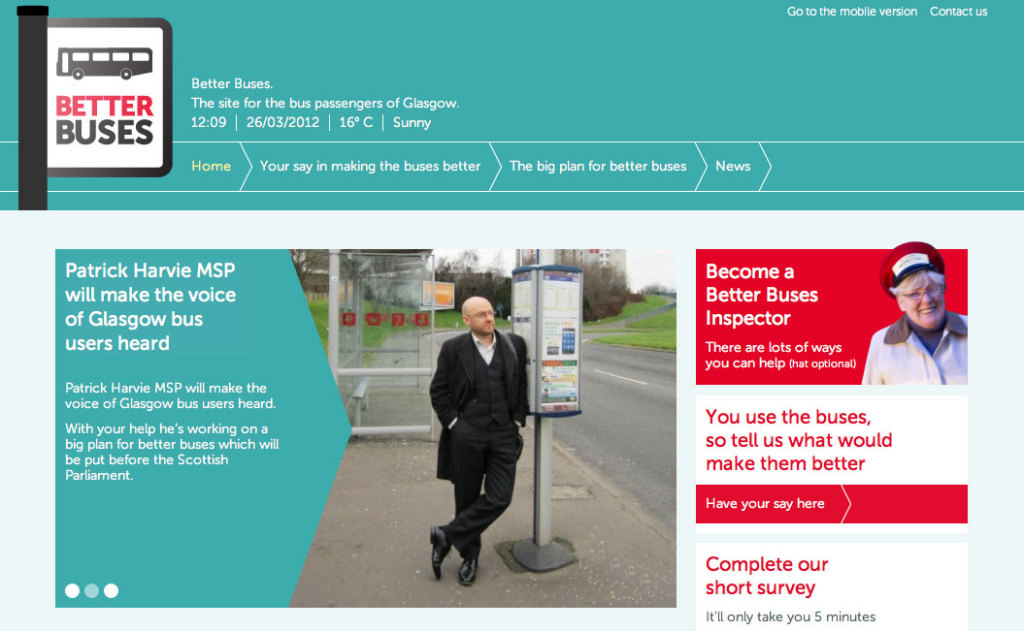The fight for Better Buses means a better democracy
Patrick Harvie, Glasgow’s Green MSP, has launched a new campaign for the interests of the city’s bus users, Better Buses.

Harvie said at the launch of the site:
Motorists have loud and powerful lobby groups – I want to give a voice to Glasgow’s bus users. Buses should be affordable and accessible, and shaped by people’s needs rather than company profits.
Glasgow has the highest proportion in Scotland of residents without access to a car – 48.8% of households. So while campaigns like this are much needed across the country, Glasgow is an obvious place to start.
The campaign will ultimately seek to put pressure on bus firms and the Scottish Government to make improvements to Glasgow’s bus services, but in many ways it is this early stage of the project that is most interesting.
The provides a platform for Glasgow bus users to arm the campaign with both their experiences and their ideas for improvement. Passengers are urged to ‘Tweet from their seat’, sending their real-time verdict on the service to the Twitter account @betterbuses. On the site itself is a platform for longer rants or proposed solutions, and users can then rate these contributions on a 5-star system.
Eight proposals for changes, written by Harvie’s campaign team, are also available for voting and commenting on. I assume that the best contributions coming direct from passengers will also join this list as the campaign develops.
So what you have is not just a campaign platform – the ability to press for a change pre-determined by, in this case, an MSP – but a community decision-making platform. Through Better Buses, Glaswegians have a tool with which to discuss the shortcomings in their bus network, and come to conclusions as to the priorities for action and solutions they want to see.
What Harvie has created is in the tradition of community democracy projects like New Orleans’ Neighborland, which come not from the top-down NGO-style campaigning model but from a desire to put power back in ordinary people’s hands.
Community decision-making, or, as it is sometimes grandly known, radical democracy, is a cornerstone of Green thought and arguably the main thing that distinguishes Green politics from the bureaucratic democratic socialism with which Green politics shares so much in policy terms. However, changing the very system by which we make decisions is daunting, and few Green politicians have really been able to advance this cause.
So it’s gratifying as a Scottish Green to see such progress being made here; this innovative campaign follows fellow Bright Green editor Maggie Chapman’s successful £eith Decides participatory budgeting event in Edinburgh.
In a week when the Cam Dine With Me scandal has demonstrated all too clearly the consequences of centralised power and further eroded public trust in politicians, it’s encouraging that one politician is willing and, more unusually, has proved able to begin a process of genuinely handing power back to the community he belongs to.
I wish the Better Buses campaign the very best of luck in improving FirstBus’ reliability, accessibility and cost, but I hope in the long run we will come to see those as the least of its achievements.




As I have suffered hate crime at bus stops I don’t tend to use them. I would though if there was ctv on every bus stop I would use them.
I am sure I am not alone in that but proabably the only one with any gumption
“Passengers are urged to ‘Tweet from their seat’”
Yeah, Glasgow bus users have they got richer in the last couple of years? Because IN MY DAY there wasn’t much in the way of twitterati on the buses, it was more First Bus profiteering the fuck out of working class Glaswegians travelling short distances into the centre.
More expensive to get the half mile from the east end to town than it was / is to get across the whole of Edinburgh on a bus 🙁
I think a fare strike would be more to the point, and discussing preferred actions only online is missing out more than half of bus users.
But hey, better than nothing.
Interesting.Good place to start.I’ve always like the SSP free public transport policy http://www.freepublictransport.org/ .This is great as a first step hopefully leading to better regulation of services in some form(both for service users and to make possible purchase cost lower 😉 ). The addition of community/participatory democracy is very welcome and a great campaigning strategy.
See also, fixmytransport.com
http://www.fixmytransport.com/issues/browse?name=Glasgow